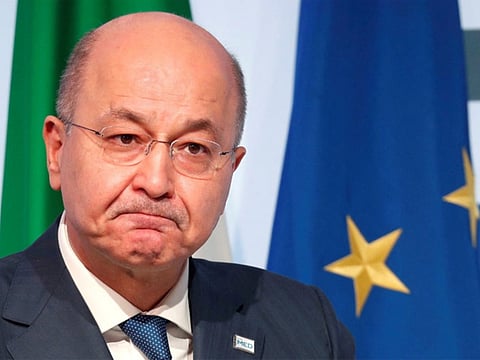US should remain engaged in Iraq, says president
Iraq is moving in the right direction but legacies of the past pose monumental challenge

Washington: Iraq is still struggling to recover from 40 years of almost uninterrupted war and internal conflict.
It has been more than a year since the country’s forces finally managed to wrest back control of Mosul, its second-largest city, from Daesh. Yet the city remains in ruins.
“If you ask me, is the Iraqi government bureaucracy successful? Absolutely not,” Iraqi President Barham Salih said in an interview.
“Is the Iraqi state succeeding? I think there are some prospects for this country to be moving in the right direction. But the legacies of the past, the problems are really, really monumental.”
He spoke at length on the need to fight a deeply entrenched culture of corruption in the bureaucracy, the government’s failure to provide basic public services such as water and electricity, and the challenge of preventing a Daesh revival.
And yet Salih is actually optimistic about the future of his country.
“Life is coming back,” he said.
“Every time I go out of the presidential palace in Baghdad—and I do try to go out as often as I can—I do see normalcy coming back, more and more. I do think there is a window of opportunity—it should be cherished. We’ve not had it like this for a long, long time. . . . precious, but precarious.”
There was “a sense of urgency” among the members of the administration of which he’s a part. (Iraqis voted in May 2018, and it took about five months to form a new government headed by Prime Minister Adel Abdul Mahdi, who is often described as a nonpartisan technocrat. Salih was elected by the Iraqi parliament on Oct. 2 by a vote of 219 to 22).
“We need to deliver,” he said.
“Otherwise we will not be able to justify what we do in the eyes of our public. And public opinion does matter in Iraq. People speak their minds. People are engaged, are interested.”
Iraq—the country identified in American minds with chaos and endless warfare—is a democracy.
Citizens vote, and leaders must respond to their demands; otherwise, they won’t be reelected.
It’s a deeply flawed democracy, to be sure, as Salih is the first to note.
Yet its institutions, created after the US-led invasion in 2003, have endured.
However, there is a major impediment to improved relations between Iraq and the United States—and that is Iran’s growing power.
The fight against Daesh has left Iranian-sponsored militias, the so-called Popular Mobilisation Forces, in a position to dominate Iraq’s security.
Secretary of State Mike Pompeo is threatening to sanction Iraqi Shiite militias and Iraqi politicians with Iranian ties, a policy almost certain to backfire.
Salih notes that Iraq has an interest in good relations with Iran, with which it shares a long and porous border.
Yet Salih says he wants to see Americans remain active in the fate of his country—through investment, education and development assistance.
Iraq, he said, “needs a reprieve. It needs a space to develop. The United States can help, has been helpful. We appreciate the help of the United States.”
Who is Salih?
Barham Salih, the president of Iraq, is from Sulaimaniyah in Iraqi Kurdistan. Born in 1960 to a prominent Kurdish family, he made his first acquaintance with Saddam Hussain’s jails at age 19.
He spent many years abroad, earning a doctorate in statistics and computing at a British university, and later returned to Iraq, where he played a prominent role in Kurdish and Iraqi politics - including a stint as the Iraqi Kurds’ representative in Washington from 1992 to 2001.
He speaks English, Arabic and Kurdish with equal facility, switching effortlessly among the languages.



